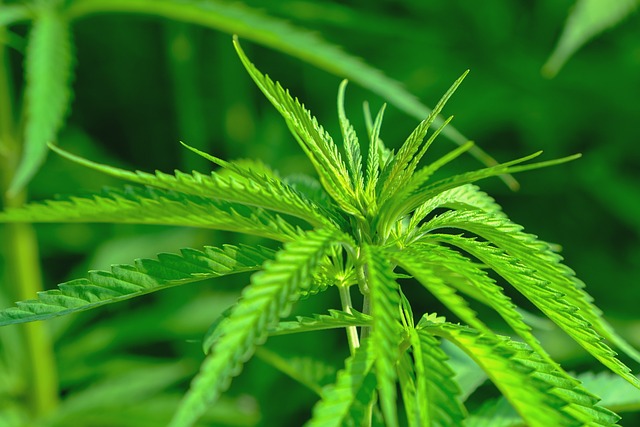THCA (Tetrahydrocannabinolic Acid), a non-psychoactive compound found in cannabis plants, has become a focus of interest for its potential health benefits and is legally recognized in California. Despite being the precursor to THC (Tetrahydrocannabinol), THCA's therapeutic properties, including pain relief, anti-inflammatory effects, neuroprotection, and potential for treating conditions like epilepsy and multiple sclerosis, can be harnessed without the psychoactive impact when used in its raw form. California's progressive legal framework allows for the exploration of these benefits within both medical and adult-use markets. The state's regulatory environment has facilitated research into THCA's applications, ranging from raw flower to edibles, making it a significant aspect of California's burgeoning cannabis industry. As studies continue, THCA's legal status and therapeutic uses are poised to be further clarified, highlighting its importance in the field of cannabinoid research and wellness.
Explore the multifaceted world of THCA flower, a cannabinoid-rich botanical that’s gaining attention for its potential health benefits and distinct legal status within California. This comprehensive guide delves into the science behind THCA, its unique legal standing, and the intricate process of cultivating, harvesting, and extracting this non-psychoactive compound. As we navigate through the art of growing THCA flower in the Golden State, we’ll also uncover the entourage effect, medical merits, and various consumption methods. With a focus on legalities, therapeutic properties, and future research directions, this article provides an in-depth look at the burgeoning role of THCA flower in California’s regulated market and beyond. Join us as we dissect the nuances of this emerging cannabinoid and its place in the expansive cannabinoid spectrum.
- Unlocking the Potential of THCA Flower: A Comprehensive Guide
- The Science Behind THCA: What Makes It Special?
Unlocking the Potential of THCA Flower: A Comprehensive Guide

Discovering the potential of THCA (Tetrahydrocannabinolic Acid) flower requires a deep dive into its properties and the legal frameworks governing its use, particularly in California. THCA, the raw form of THC (Tetrahydrocannabinol), is found in cannabis plants and is non-psychoactive. It’s through decarboxylation—heating or curing—that THCA converts into THC, unlocking its psychoactive effects. In California, where the recreational use of cannabis is legal, THCA flower holds a unique position in both the medical and adult-use markets. Consumers and researchers alike are intrigued by THCA’s potential therapeutic benefits, which may include pain relief, anti-inflammatory properties, and neuroprotective effects, making it a subject of scientific interest for its health implications. The legal status of THCA flower in California allows for its exploration in various consumption methods, from raw flower to infused edibles, thereby opening avenues for both medicinal and recreational use. Understanding the intricacies of THCA and its derivatives is crucial for those navigating the cannabis landscape, especially in a state with a well-established cannabis industry like California.
The Science Behind THCA: What Makes It Special?

Delta-9-tetrahydrocannabinolic acid, commonly known as THCA, is a cannabinoid found in the Cannabis sativa plant. While its psychoactive properties are fully realized when heated to form THC, THCA itself possesses unique therapeutic potential. Preliminary research suggests that THCA may offer analgesic and anti-inflammatory effects, making it a subject of interest for those exploring cannabinoids for wellness or medical purposes. The legal landscape in California has evolved to distinguish between THCA and its psychoactive counterpart, THC. As such, products containing raw cannabis, including THCA, are often considered legal under California state law, provided they do not exceed the state’s cultivation limits and are used in accordance with local regulations. This distinction is pivotal for consumers and researchers alike, as it opens up new avenues for exploring the medicinal properties of cannabis without the psychoactive side effects associated with THC.
Furthermore, THCA’s interaction with the endocannabinoid system, which regulates a range of physiological processes, is an area of burgeoning scientific interest. Studies have indicated that THCA may have neuroprotective properties and could potentially be beneficial in treating conditions like epilepsy and multiple sclerosis. The anti-emetic qualities of THCA are also being investigated, with promising results that could lead to its use as an effective treatment for nausea and vomiting, particularly in chemotherapy patients. As research continues, the full spectrum of THCA’s effects and its legal status in California and beyond will undoubtedly become clearer, offering new insights into the potential benefits of this cannabinoid acid.
THCA flower stands at the forefront of cannabinoid research and therapeutic applications. Its unique properties, as detailed within this guide, offer a promising outlook for those seeking alternative wellness solutions. With a growing understanding of its potential benefits, particularly in regions like California where THCA-rich hemp products are legally available, there’s an exciting future on the horizon for this naturally occurring compound. As regulations evolve and more research is conducted, the significance of THCA flower is poised to become increasingly recognized within the health and wellness community.
